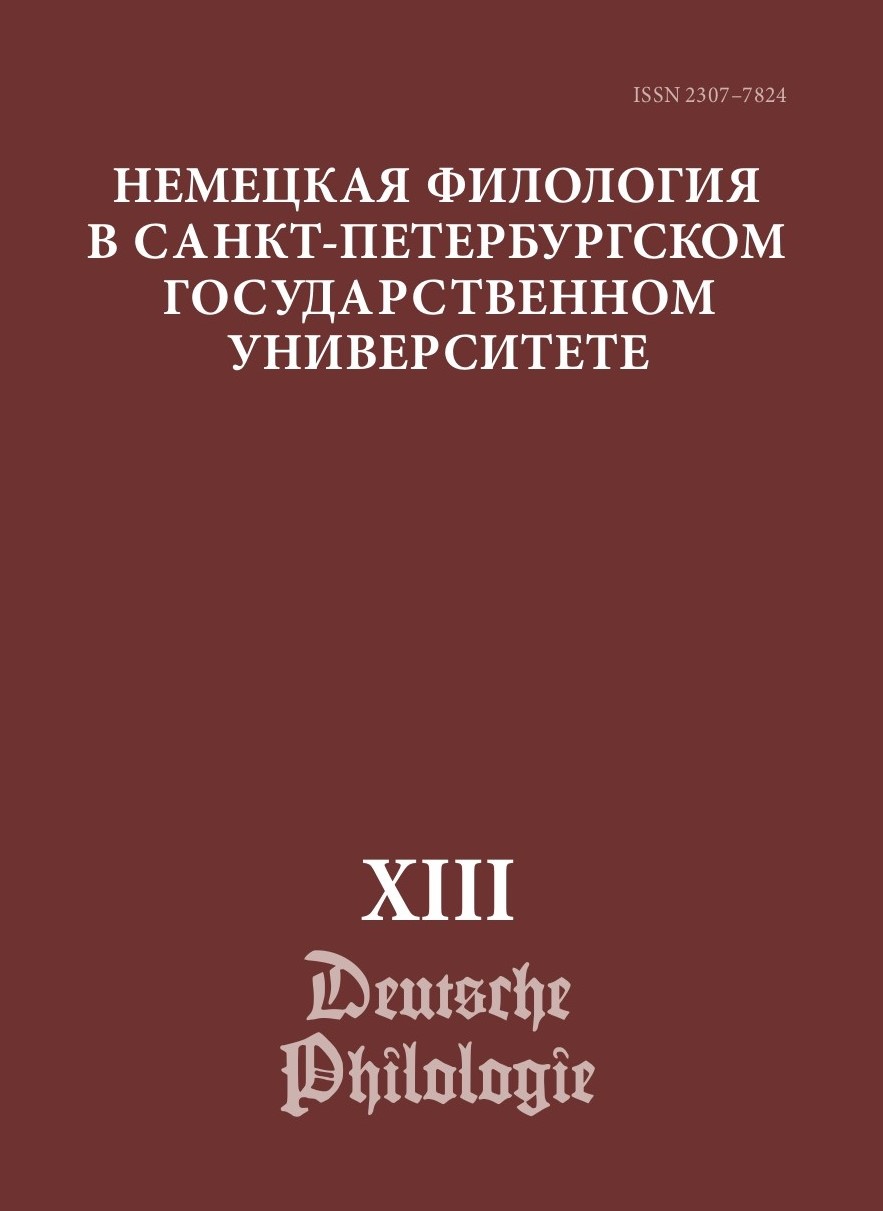ETHICAL AND MORAL ASPECT IN THE DISCUSSION ABOUT GENDER CORRECTNESS IN GERMAN LANGUAGE
DOI:
https://doi.org/10.21638/spbu33.2023.125Abstract
The article deals with a problem of gender correct forms in the modern German language in the context of communicative category of politeness that regulates language behavior and provides its success. The goal of the study is to define how the supporters of gender correctness and their opponents use the moral and ethical argument to persist in their opinion and how it influences the language behavior of the people. The materials are borrowed from German online-media for the period from 2018 to 2022. With the help of the method of context analysis there were considered expressions of supporters of gender correctness and their opponents in point of relations to the recipient, to the meaning of gender correct forms, to the interaction between language and non-language reality. The supporters of gender correctness act in the tradition of feminist and gender linguistics. They believe using of the masculine form of the nouns in general meaning to be discriminating, consider the influence of language forms on the reality and come out for deliberate changes in the language. Because of connecting of the gender correct forms with ideas of equality and justice the speakers are forced to explain and to justify their language behavior. The opponents doubt about positive reaction to the gender correctforms from the recipients, demonstrate the influence of gender correct changes on the meaning of words and phrases, deny the direct connection between language forms and thoughts and behavior of the people. The study contributes to developing of communicative theory and scientific language criticism.
Keywords:
category of politeness, gender correctness, gender linguistics, media linguistics, German
Downloads
References
Литература
Антропова Н. А. К вопросу гендерно-корректного употребления немецкого языка // Зарубежная филология. Гуманитарный вектор. Серия: Филология, востоковедение. 2016. Т. 11, № 3. С. 49–55.
Вежливость и антивежливость в языке и коммуникации. Материалы Международной научной конференции, состоявшейся в Институте лингвистики РГГУ 23–24 октября 2018 г. М.: Политическая энциклопедия, 2018. 318 с.
Брагина Н. Г. Вежливость как невежливость: на стыке разных культурных норм и правил // Вежливость и антивежливость в языке и коммуникации. Материалы Международной научной конференции, состоявшейся в Институте лингвистики РГГУ 23–24 октября 2018 г. М.: Политическая энциклопедия, 2018. С. 38–44.
Ларина Т. В. Вежливость, невежливость и грубость в межкультурном аспекте // Вежливость и антивежливость в языке и коммуникации. Материалы Международной научной конференции, состоявшейся в Институте лингвистики РГГУ 23–24 октября 2018 г. М.: Политическая энциклопедия, 2018. С. 133–144.
Петрова Е. И. Тенденции феминизации современного немецкого языка // Верхневолжский филологический вестник. 2019. № 3 (18). С. 134–139.
Ситникова И. О., Смолоногина Е. А. Влияние языковой гендерно политики на речевую практику в немецкоязычных странах // Вестник МГЛУ. Гуманитарные науки. 2021. Вып. 6 (848). С. 171–181.
Слинина Л. Я. Реализация идеи гендерной корректности в современных немецкоязычных СМИ // Современный ученый. 2022. № 2. С. 65–68.
Шаронов И. А., Козодаева М. Невежливость и «антивежливость»: две мишени речевого этикета // Вежливость и антивежливость в языке и коммуникации. Материалы Международной научной конференции, состоявшейся в Институте лингвистики РГГУ 23–24 октября 2018 г. М.: Политическая энциклопедия, 2018. С. 292–299.
Kilian J., Niehr T., Schiewe J. Sprachkritik: Ansätze und Methoden der kritischen Sprachbetrachtung. Berlin; Boston: Walter de Gruyter, 2016. 215 S.
Samel I. Einführung in die feministische Sprachwissenschaft. Berlin: Erich Schmidt Verlag, 2000. 247 S.
Spieß C., Günthner S., Hüpper D. Perspektiven der Genderlinguistik // Genderlinguistik. Sprachliche Konstruktionen von Geschlechtsidentität / S. Günthner, D. Hüpper, C. Spieß (Hrsg.). Berlin; Boston: Walter de Gruyter Verlag, 2012. S. 1–31.
References
Antropova N. A. On the Issue of Gender Correct Using of German. Zarubezhnaia filologiia. Gumanitarnyi vektor. Series: Filologiia, vostokovedenie, 2016, vol. 11, no. 3, pp. 49–55. (In Russian)
Bragina N. G. Politeness as Impoliteness: at the Joint of the Different Cultural Norms and Rules. Vezhlivost’ i antivezhlivost’ v iazyke i kommunikatsii. Materialy Mezhdunarodnoi nauchnoi konferentsii, sostoiavsheisia v Institute lingvistiki RGGU 23–24 oktiabria 2018 g. Moscow, Politicheskaia entsiklopediia Publ., 2018, pp. 38– 44. (In Russian)
Kilian J., Niehr T., Schiewe J. Sprachkritik: Ansätze und Methoden der kritischen Sprachbetrachtung. Berlin, Boston, Walter de Gruyter, 2016. 215 S.
Larina T. V. Politeness, Impoliteness and Rudeness in the cross-cultural aspect. Vezhlivost’ i antivezhlivost’ v iazyke i kommunikatsii. Materialy Mezhdunarodnoi nauchnoi konferentsii, sostoiavsheisia v Institute lingvistiki RGGU 23–24 oktiabria 2018 g. Moscow, Politicheskaia entsiklopediia Publ., 2018, pp. 133–144. (In Russian)
Petrova E. I. Tendencies of Feminization in the Modern German Language. Verkhnevolzhskii filologicheskii vestnik, 2019, no. 3 (18), pp. 134–139. (In Russian)
Politeness and antipoliteness in Language and Communication. Materialy Mezhdunarodnoi nauchnoi konferentsii, sostoiavsheisia v Institute lingvistiki RGGU 23–24 oktiabria 2018 g. Moscow, Politicheskaia entsiklopediia Publ., 2018. 318 p. (In Russian)
Samel I. Einführung in die feministische Sprachwissenschaft. Berlin, Erich Schmidt Verlag, 2000. 247 S.
Sharonov I. A., Kozodaeva M. Impoliteness and Antipoliteness: Two Targets of speech etiquette. Vezhlivost’ i antivezhlivost’ v iazyke i kommunikatsii. Materialy Mezhdunarodnoi nauchnoi konferentsii, sostoiavsheisia v Institute lingvistiki RGGU 23–24 oktiabria 2018 g. Moscow, Politicheskaia entsiklopediia Publ., 2018,pp. 292–299. (In Russian)
Sitnikova I. O., Smolonogina E. A. Influence of the Language Gender Politics on Speech Practice in the German-speaking Countries. Vestnik MGLU. Gumanitarnye nauki, 2021, iss. 6 (848), pp. 171–181. (In Russian)
Slinina L. Ja. Realization of Idea of Gender Correctness in the Modern German- speaking Media. Sovremennyi uchenyi, 2022, no. 2, pp. 65–68. (In Russian)
Spieß C., Günthner S., Hüpper D. Perspektiven der Genderlinguistik. Genderlinguistik. Sprachliche Konstruktionen von Geschlechtsidentität, hrsg. S. Günthner, D. Hüpper, C. Spieß. Berlin; Boston, Walter de Gruyter Verlag, 2012, S. 1–31.
Downloads
Published
How to Cite
Issue
Section
License
Условия передачи авторских прав на статьи и рецензии, опубликованные в ежегодном периодическом издании «Немецкая филология» регулируются условиями Лицензионного Договора автора с Санкт-Петербургским государственным университетом. В соответствии с Лицензионным Договором опубликованные материалы находятся в открытом доступе, а авторам бесплатно предоставляется неограниченные возможности их распространения и самостоятельного архивирования.




